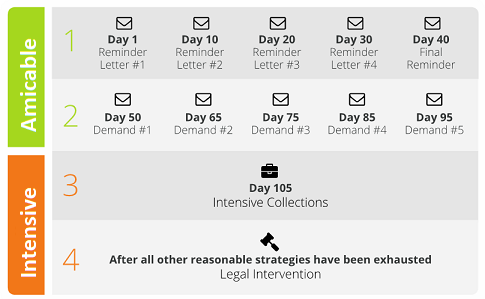
Confused between the Flat-fee Collection service and Contingency Collection service? Which one to choose?
Flat-fee is the most amicable way to recover debt, while Contingency collection is more intensive. We will point out the differences in a very easy-to-understand manner.
| Flat Fee Collections (✉) | Contingency Collections ( ☏ ) |
| You buy a block of accounts from a collection agency, then keep using them over time. For example: If you think you would be sending collection notices to about 100 people over a period of 2 years, buy 100 accounts. | You do not buy anything in advance. No upfront cost is involved. Collection agency keeps a portion of what they recover. No recovery means no fees. |
| The amount charged by a collection agency is about $15 per account. Even if you have to recover an Amount Due of as low as $30 or as high as $100,000, the cost per account does not change. You pay a fixed fee of $15 per account. If you buy more accounts, the collection agency will lower your cost per account. | The average contingency fee is about 40%. This means if a collection agency recovers $1000 from your debtor, then they will keep $400 and you will be given $600. You can negotiate a lower fee for higher amounts. For example, if your Amount Due on an account is $100,000 you can ask the collection agency to change only 20%. If your amount is between $10,000 to $100,000 you may ask them to charge 30%. For lower amounts, a contingency fee between 40% to 50% applies. |
| The debtor pays directly to you, not the collection agency. | The debtor is told to make payments to the collection agency. However, even if the debtor pays you directly, still you are legally bound to return the contingency fee portion to the collection agency. |
| Best for accounts less than 180 days past due. | Best for accounts over 180 days past due. |
| Five collection demands (letters) are sent to your debtor. | A human debt collector contacts your debtor multiple times, even offers a payment plan if necessary. |
| A cheaper way to recover money. | Costlier. However far better than recovering some money rather than writing off the entire amount as a loss. |
| Always better to start with the fixed fees step. You will save money. Transfer only those accounts for contingency collections that remain unpaid after fixed fee service. | Accounts that are complicated ( ex: foreclosure, disputed ) or those carrying balances over $10,000 should be directly assigned here. Or those over 180 days past due. |
| More amicable form of collections. Preserve your terms with the debtor. | More intensive than the fixed fee collections. Relations can still be saved, but chances are lower. |
| You can stop collection activity at any time. | The collection agency decides when to stop. |
| The next step is Contingency Collections if money is not recovered. | The next step is taking Legal action. |
| All accounts are skip traced to find the debtor’s latest address. Usually, the USPS change of address service is used. | Advanced skip tracing techniques are used. |
| For debtors who do not pick their phones, written demands will still reach them. (huge advantage) | If a debtor does not pick up their phone, your collection agency cannot do much. It is often a dead end, they may go credit reporting and that’s it. |
| Not all collection agencies offer this service. | Nearly all collection agencies offer this service |
Need a collection agency that offers both services and can recover money all across USA? Contact us